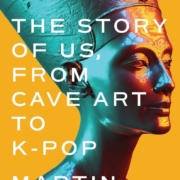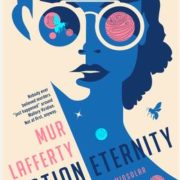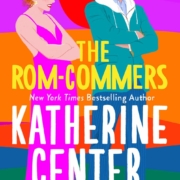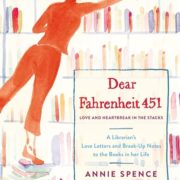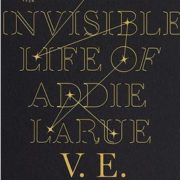We Ride Upon Sticks by Quan Barry
With its brightly colored cover and its strange title, WE RIDE UPON STICKS by QUAN BARRY caught my attention immediately. If I had been more familiar with the plot, it is possible that I would have been more suspicious of the way it instantly grabbed me.
In the summer of 1989, the members of a high school field hockey team pledge themselves to the powers of darkness in order to make it to the state championships.
The novel is set in Danvers, Massachusetts, a small town outside of Salem. It is common knowledge in Danvers that much of the chaos of the Salem witch trials actually happened in their town – which was called Salem Village at the time.
During the previous school year, Mel Boucher found herself reading a reference book about the trials. The story of the teenage girls whose interest in witchcraft sparked the witch hunt inspires Mel to do some dabbling of her own.
The Danvers Falcons have been consistently terrible for years. Starting with Mel Boucher, the team decides to take matters into their own hands and, one-by-one, sign their names over to the darkness – represented by a notebook featuring Emilio Estevez.
Each member has their own reasons for signing the book. Everyone wants the team to win the state championship, but they each have their own personal goals that become clear over the course of the novel.
Julie Kaling, for example, lives in a restrictive, uber-religious household. When she signs her name, she asks the darkness to help her with a project. Her dreams revolve around a dress she wants to make for prom. With the boldness given to her by “Emilio” she begins spending her free period in the Home Ec room, working on her masterpiece.
Initially, signing their names seems to be enough. They obliterate the competition at their summer training camp, but once the regular season starts, they are only scraping by with narrow wins.
As the team soon finds out, the only way to appease the darkness (and secure their victories) is by doing dark things. Which the team takes to with a vengeance. They use their new power to affect change in the school and come into their own power as young adults.
AJ Johnson is upset about the racism in her English class curriculum. She uses this anger to start a rumor about a teacher, but then she decides to affect change more directly and run for student council president. Thanks to the darkness, she wins easily without ever putting up a poster.
The Falcons’ varsity team – Abby Putnam, Jen Fiorenza, Girl Cory, Little Smitty, Mel Boucher, AJ Johnson, Boy Cory, Julie Kaling, Sue Yoon, Becca Bjelica, and Heather Houston – are seniors. Like many high school students, they are trying to reconcile who they have always been with who they want to be.
Ultimately the book is about the internal power we all have, if we choose to harness it. Many of the team’s accomplishments were within their own power, they just needed the confidence to take action. On the other hand, I’m not completely sure that they weren’t also doing magic.
Reading WE RIDE UPON STICKS was a delight. It was a very unique novel, with only a small amount of actual field hockey – for which I am grateful.
Barry’s writing style is very visual. I was not surprised to find out that she is also a prize-winning poet. Jen Fiorenza has the iconic 80s teased bangs, which the team lovingly refers to as “the Claw.” Every time she mentions the Claw, Barry describes its subtle movements – which reflect the way Jen is feeling – from a tall, platinum railroad spike to a sad stack of pancakes.
She also perfectly captures the spirit of high school. Barry uses little details to accomplish the high school atmosphere, like the fact that the Danvers Falcons think about each other as either a first and last combo name, Abby Putnam, or exclusively by a nickname: Boy Cory.
The reader is given a glimpse into each character in turn, watching them go through their biggest moment of change.
By relying on each other – and using the powers of Emilio – each member of the team is able to accomplish something they never thought they could. As long as they don’t go too deep into the darkness.


